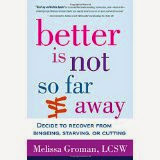
Why do we humans threaten separation when what we really want is closeness?
I don't like to generalize, but I do get to observe a lot of patterns from where I sit, working with couples in pain. And I can tell you this: When feeling frustrated, angry and misunderstood, frightened or lonely, women can tend to threaten and complain rather than ask (for help) and explain (what they need). Its not that men don't threaten, but its the women who seem to somehow collectively, naturally, use threats and complaints to try to get what they need.
And it usually fails miserably. With devastating effects.
Example: Woman is at home all day with the baby. She is tired and worn out, and needs a break. Man comes home from work, also stressed out, long day too. He walks in and she is waiting for him. In her mind, she needs some love, some TLC, some appreciation for how demanding child care is, and household tasks. She wants him to mind read. She understandably needs what she needs.
He too needs some down time, he is thinking. He wants to check out that motorcycle ad on Craigslist again. He needs to stop thinking about his pissy boss. He wants to kiss the baby, grab a bite and go online. Later he wants sex. He feels kind of warm to his wife, but really wants his man cave time. He does not know she needs this love now. He would give it to her, actually, if he knew. Everyone knows they have to bend and give somewhat, but somehow that gets lost in the wrong words:
She says: "You're late."
He says: "My boss is at it again."
She says: "You could've called. You don't seem to think about us at all."
He says: "I am out making money to support us. What do you think I do all day, play cards?"
She says: "Do you think I'm eating bon bons here with my feet up?"
(okay, there are lots of versions of this, you know how it goes...and...on to threats....)
He says: "What do you want from me?"
She says: "Just forget it. I think we should separate."
There are a million reasons why women do this. Hormones, history, personality, biology. Too many bad feelings all at once. Abandonment, frustration, fear, self pity, disappointment, protest. Exhaustion. A stew of possible answers. Thinking that where there is love, there should be no need to ask for what you need and reward the giver. Thinking that we should not have to work so hard to choose the right words. Thinking that somehow a fight feels like some connection, some attention, some energy, even if its negative or hostile. Thinking that the thought of losing her will shake him into giving love. Or that the threat of seperation will inspire fear or establish power, or protect from hurt.
Sometimes, in these bad moments, we do think we should seperate if we hopeless that we cannot or will not be able to get what we need.
Often people think that they reach threats as a last resort. But I think its not always so. Threats seem to pop up
impulsively, out of pain or frustration, but often times not nearly as a last resort. And not as a carefully thought out, well discussed (with a trusted, objective third party), and after having given the arch of pain some time to ebb just enough for some rational thought to be present. Threats are often the
Id at work. We want relief. We want it now.
So it happens. The wrong words. Complaints and threats. Lots of times, out of pain or desperation, but still, they have a
devastating, snowball and sometimes
irrepreprable effect.
A male colleague of mine once told me that when his wife got really angry with him she would tell him that she wanted a divorce. He would always feel totally crushed and misunderstood by this, as well as
attacked. He said it made him feel manipulated and abandoned and far too
criticized and demeaned. He had some idea what she really wanted, but her complaints always gave him the idea that he could never quite satisfy or please her. He was frustrated and furious that she could not just tell him what would give her relief and pleasure. The threats squashed any positive feeling he had about his wife. He knew somehow, that she did not really want to divorce him, she just wanted to be understood, to work something out, to get him to give her something. He wished he could read her mind. In fact, sometimes he thought he could, but the effect of those threats, along with the
criticism, seemed to chop off any positive feelings he could have, any logic even. And eventually any willingness to keep trying.
So after the last time she threatened divorce, he said fine. Lets divorce if that's what you want. And they did. He packed his bags that night and never came back. Not however, because either of them really wanted this, or because it was what was best for the kids, or for themselves even. There were, actually, plenty of good feelings between them too. They had helped each grow and make progress in life. She even begged him to change his mind after he left, and come back. But because he was so tired of being threatened, he attached himself to calling her out on her bluff. He stood his ground.
To this day, she blames him for it. She says she cannot believe that he actually left. She tells everyone that he left her. He shakes his head at this when he tells me about it. He tells me that she threatened divorce so often, that he could not go back. She did, he tells me, sound clear headed about it sometimes even. But when she tells her story, she says now, that she never
really meant it. She really meant that she was hurting. That she wanted him to come closer. To understand her pain. To love her. To see how he hurt her sometimes. She was trying to get through to him, she says.
Crazy. It sounds crazy. And yet, I hear it all the time in my office. Why doesn't it go like this:
She says, "I am happy to see you! I know you've had a long day. I missed you. When can we spend some time together?"
He says, "Its nice to be home. My boss is a pain. You are sight for sore eyes. I need 10 minutes to cool off and then we can talk."
She says, "Great, thank you sweetheart."
And if she needs to say more:
"I am feeling so lonely. Can we hang out together more tonight? I always feel better when we do."
He says, "I did want to check out that motorcycle ad."
She says, "Can I check it out with you? Sounds fun."
This does not mean she has to agree to him getting a motorcycle, it means she can share his wish and dream with him! It means they can have time together. This does not mean she won't get to say how angry she is that he does not call during the day more. And this does not mean that all is peachy between them, but it means there is room to work. Room to
really get what might be needed. To learn what might be needed. To have more instead of less. It means we do have to have other ways of saying how bad we feel without threatening, because after the divorce, its a lot harder to get anything, including peace of mind.
After the divorce, the blaming only gets worse. So does the anger for a while. Its a psychosis even, this rejection confusion. Who left? Who deprived who? And who's fault is it anyway? Everyone feels rejected, hurt and confused. And clear about one thing at least, that there is pain.
Of course, sometimes parting is necessary, pain and all. But I think there is much hope, as always, Tending to our words and sorting out what we really want and how to get it can bring us relief and good results, if we can hold on through the hurt and hold off on the threats.
 More often than not when people walk into my office, they are in some amount of emotional pain. There is perhaps, confusion, frustration, anger, grief, all simmering around inside them, with no good place to go.
More often than not when people walk into my office, they are in some amount of emotional pain. There is perhaps, confusion, frustration, anger, grief, all simmering around inside them, with no good place to go.










